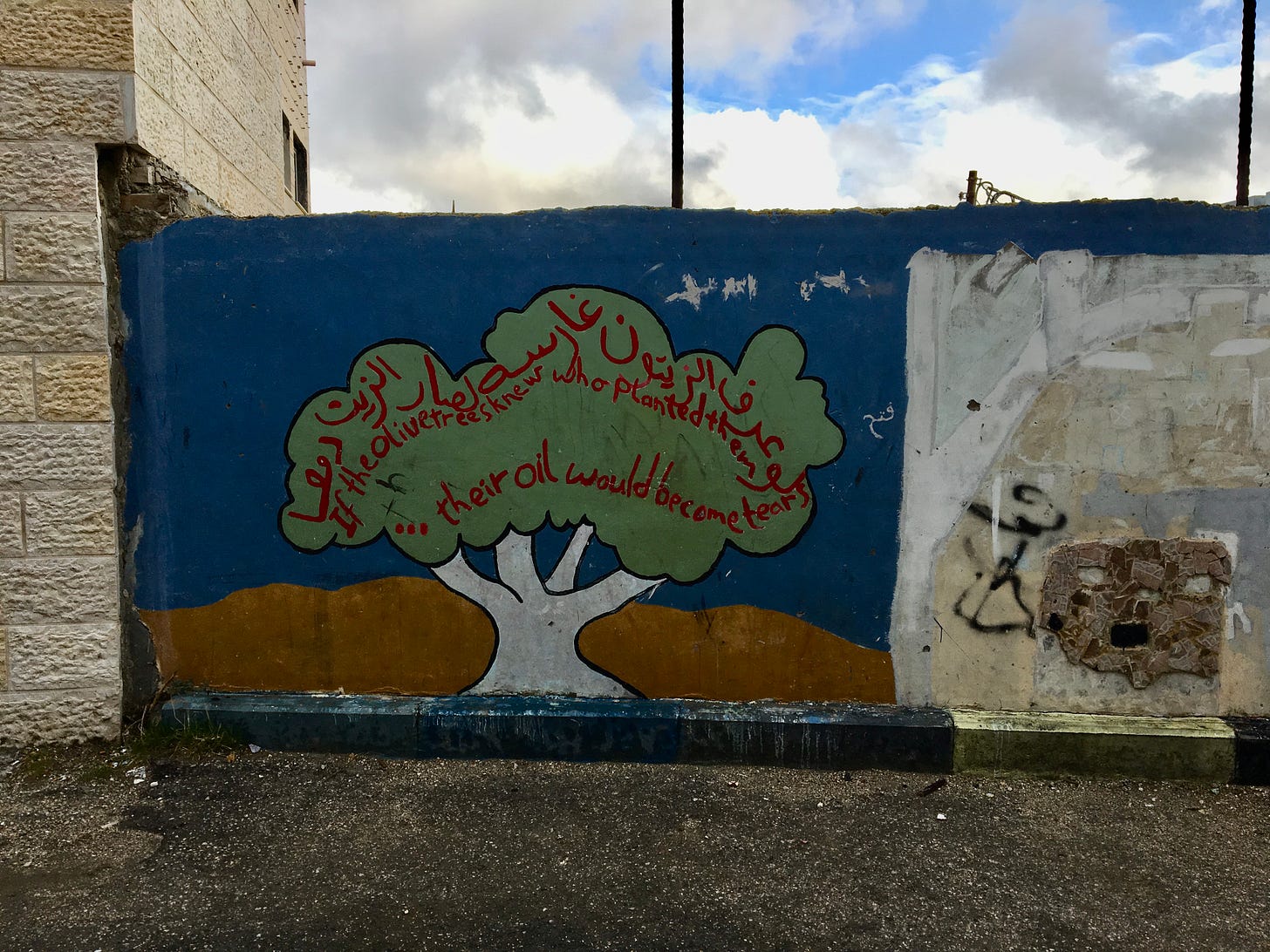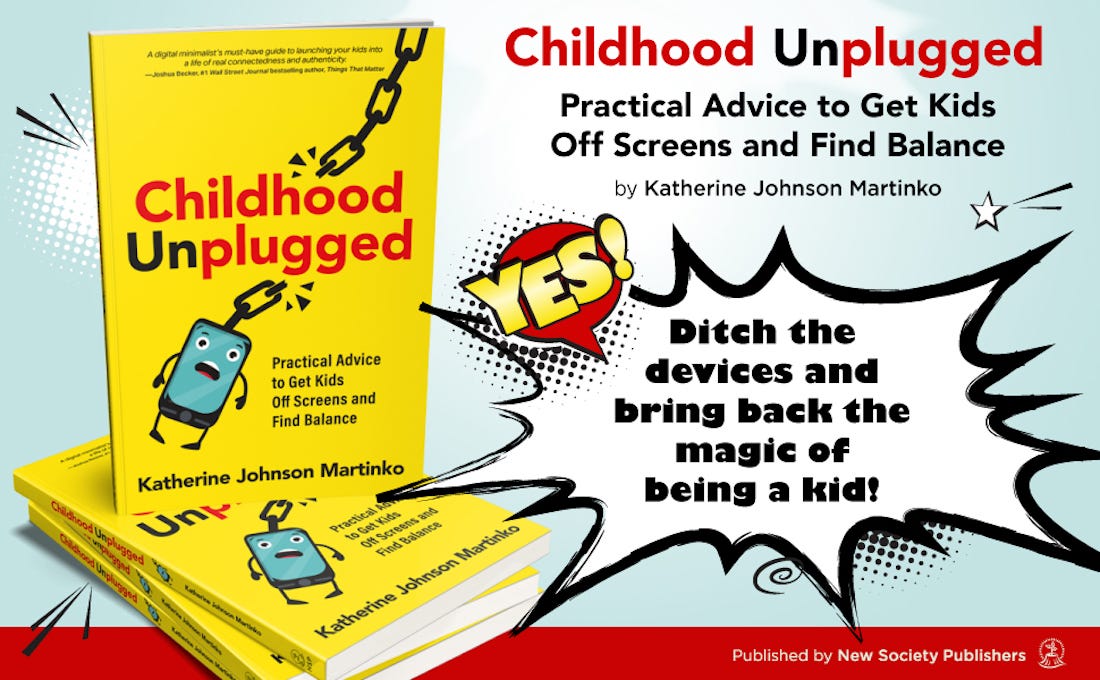Three Things, Week 41.23
Canadian Thanksgiving, dopamine-induced "acedia", and an olive tree for peace
1. Canadian Thanksgiving
This past weekend was Thanksgiving in Canada. It’s a wholly different holiday than its American counterpart, much smaller and lower-key and without all the consumerism that gets tacked on because of Black Friday. Instead, Canadian Thanksgiving (at least in my family) has always been more focused on gathering after the busy summer months, hiking in the crisp fall air while admiring the fading leaf colours, and feasting with whoever is around to join the dinner table.
This year, it poured rain for the entire long weekend, but that didn’t affect my enjoyment of it at all; I was just so happy to be up north. The first night, my kids and I stayed in my parents’ off-grid cabin near Algonquin Park. I needed to be in absolute solitude, with spotty cell reception and nothing to do except read my book wrapped in a blanket overlooking the lake while drinking bottomless cups of coffee.
The kids built fires and “hunted” grouse with a bow and arrow in the bush. (They didn’t catch anything. I would have been amazed if they did.)
After I was recharged, we joined the extended family at my childhood home in Dorset, Ontario, where my son and I worked the final dinner shift of the year at the family’s wood-fired pizzeria and we all went home, exhausted, to celebrate another successful season.
The rest of the weekend was spent in proper lazy fashion. Fires crackled in the wood-burning cookstove, as well as the fireplace. Board games were played. Books were read (I devoured Pineapple Street in two days). Conversations were had over glasses of wine and charcuterie. We went on a long, wet hike while an enormous turkey roasted in the oven. The hike is an annual pre-Thanksgiving dinner necessity because it makes me feel like I’ve earned the gluttony of that meal!
The dinner table was surrounded by family and close friends, and we feasted on the usual—turkey, stuffing, mashed potatoes, squash, salad, and cranberry sauce—as well as a wonderful Ottolenghi eggplant dish with tahini sauce that I made, and Aunt Elspeth’s famous carrot cake for dessert.
Because there were so many guests in the house, Jason and I were directed to sleep outside on the screened porch. This filled me with some concern, as it was 2˚Celsius outside and the wind was blowing wildly. It was even snowing at one point. But, layered with a foot of duvet, wool blanket, and quilt, and paired with a hot water bottle, hat, and socks, I ended up feeling wonderfully cozy. It was sort of like camping, except better because the bed was wider, flatter, and more solid, and there were no tent walls moving in the wind.
2. ‘Acedia’ + Digital Madness
I am almost finished reading Digital Madness: How Social Media Is Driving Our Mental Health Crisis—and How to Restore Our Sanity by Nicholas Kardaras, Ph.D. He is a renowned psychologist and addiction specialist whose work I’ve been familiar with for years, but I had not read one of his books. This is his latest, and it’s a scathing criticism of social media’s effect on young people. I don’t love his writing style—I find it a bit sensationalist—but the material is interesting and up-to-date.
I’ve been thinking about his description of acedia, an ancient Greek word that means “an inert state without pain or care,” also understood as a spiritual and mental sloth. Kardaras uses it to describe “the modern dopamine-desensitized digital citizen: numbed, apathetic, and lacking any fire or passion.” Excessive screen time, he argues, has made young people immune to the thrills of everyday life. They’ve become so accustomed to getting dopamine hits from a constant stream of social media, gaming, and chat notifications that anything apart from those dopamine-spiking platforms pales in comparison.
“Sitting in a classroom, former hobbies, face-to-face relationships, a walk in nature, etc., leaves a person feeling under-stimulated as they experience an inevitable dopamine crash… a depression, boredom, emptiness, and anhedonia, where experiencing pleasure can feel impossible.”
A bit later, he talks about the boredom epidemic among Millennials and Gen Z’ers who, due to overstimulation by electronic devices, now suffer from chronic feelings of emptiness and ennui. They’ve become so accustomed to immediate rewards that pursuing activities and interests that require time to earn and achieve ability seems impossible. In other words, by succumbing to constant distraction and gratification, many have hardened themselves to true wonder.
Related: What Is the U.S. Surgeon General Saying About Social Media?
I find this so incredibly sad. Not to be able to feel happiness from the smallest of things, from the most mundane of daily events, would be such a loss. To live without a sense of purpose and meaning would be horrible. And while it tragically happens to many people who suffer from clinical depression, the thought that we might be causing and perpetuating it in our children by allowing them excessive screen time—a relatively easy-to-solve issue—is gut-wrenching to me.
The concept of acedia stands in sharp contrast to the poetry of Mary Oliver, whose work I’ve been reading lately. She mastered the art of noticing at a level I can only dream of attaining someday. Nothing passed her by, and I read her poems with a sense of wonder that borders on envy: If only I could watch the world so attentively.
From yesterday, a line that seared me deep within and reads like the anti-acedia, Oliver wrote:
Instructions for living a life:
Pay attention.
Be astonished.
Tell about it.
3. An Olive Tree
There is so much sadness and pain in the news this week. I do not have a political opinion to share, as the conflict is ancient and complex, and I do not feel sufficiently informed to weigh in on it. I do know that violence makes me sick and only ever begets more violence.
I also know that, when I visited Israel and the West Bank in 2016, I loved every second of it. I met wonderful people on both sides of the wall and the political conflict. I was wined and dined in Tel Aviv, visited kibbutz in the desert, invited to eat at the night market in Machne Yehuda by the head of Slow Food Israel. I had an unforgettable intimate Shabbat dinner with the Silverman family in Jerusalem (yes, as in Sarah). I climbed Masada and watched the sun rise over the Dead Sea. Then I stayed alone in the Arab quarter in Jerusalem, visited Bethlehem at Christmas, and spent a day with an aid worker in a Palestinian refugee camp.
I tried to listen to both sides. I tried to soak it all in, and it made a huge impression on me. I think about it often. I have wanted to go back for seven years.
This week, I went back to look at my photos and came across this one that I took on a street in Palestine. It shows an olive tree, an ancient symbol of peace, and it says, “If the olive trees knew who planted them, their oil would become tears.” I think that applies to everyone touched by this conflict, no matter where they’re from.
You Might Also Like:
Cooking Lessons From My Mennonite Grandma
Three Things: Pumpkinfest, Teens With Smartphones & Cream Cheese Cookies
When Adults Help Kids
My book, Childhood Unplugged, is available here and wherever books are sold:











I really loved reading your post and reminiscing about when I have been around a Canadian Thanksgiving table! I also admire so much how you and Jason are raising your family! I am glad we are still connected by friendship and by Leslie being your cousin!
Thanksgiving looks wonderful. Best to everyone in your family. We are celebrating it late, this weekend because I came back from Denver on Saturday and, to protect Kelly I have been relegated to the basement for a week.